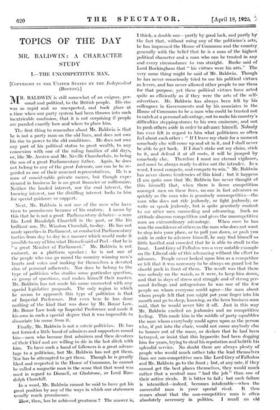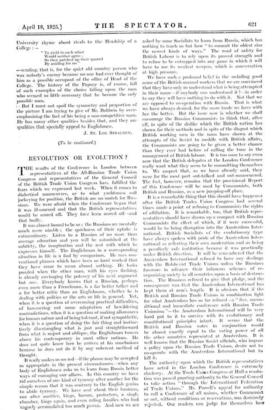TOPICS OF THE DAY
MR. BALDWIN: A CHARACTER STUDY I.—THE UNCOMPETITIVE MAN. [COPYRIGHT IN THE UNITED STATES BY THE Independent mosT04, ALL BALDWIN is still somewhat of an enigma, per sonal and political, to the British people. His rise was so rapid and so unexpected, and took place at a time when our party system had been thrown into such inextricable confusion, that it is not surprising if people are puzzled exactly how and where to place him.
Tbz first thing to remember about Mr. Baldwin is that he is hot a party man on the old lines, and does not owe his rise to power to the old conditions. He does not owe any part of his political status to great wealth, to any connexion with one of the ruling families of old days, or, like Mr. Austen and Mr. Neville Chamberlain, to being the son of a great Parliamentary father. Again, he does not belong to any of the great Interests, nor can he be regarded as one of their 'annexed representatives. He is a man of considerable private means, but though experienced in business he is no great financier or millionaire. Neither the landed interest, nor the coal interest, the brewing interest, nor the distilling interest looks to him for special guidance or support.
Next, Mr. Baldwin is not one of the men who have risen to prominence because of his oratory. I mean by this that he is not a great Parliamentary debater—a man like Lord Randolph Churchill in the past, or like his brilliant son, Mr. Winston Churchill, to-day. He has not made speeches in Parliament, or conducted Parliamentary tactics from day to day in a manner which would make it possible to say of him what Disraeli said of Peel—that he is "a great Member of Parliament." Mr. Baldwin is not eminent, as a platform. speaker ; he is not one of the people who can go round the country winning men's hearts and votes and making for themselves a devoted clan of personal adherents. Nor does he belong to the type of politician who studies some particular question, or group of questions, and makes himself their master. Mr. Baldwin has not made his name connected with any special legislative proposals. The only region in which he seems to approach this type of politician is that of Imperial Preference. But even here he has done nothing of the kind that was done by Mr. Bonar Law. Mr. Bonar Law took up Imperial Preference and made it his own in such a special degree that it was impossible to dissociate his name from it.
Finally, Mr. Baldwin is not a coterie politician. He has not formed a little band of admirers and supporters round him—men who become first admirers and then devotees of their Chief and are willing to die in the last ditch with him. To have such a band of followers is a great advantage to a politician, but Mr. Baldwin has not got them. Nor has he attempted to get them. Though he is greatly liked and respected in the House of Commons, he cannot be called a magnetic man in the sense that that word was • used in regard to Disraeli, or Gladstone, or Lord Randolph Churchill.
In a word, Mr. Baldwin cannot be said to have got his great position by any of the ways in which our statesmen usuallyreach prominence.
k.LOv, then, has he achieved greatness-? The answer is, I think, a double one—partly by good luck, and partly by the fact that, without using any of the politician's arts;' he has impressed the House of Commons and the country generally with the belief that he is a man of the highest political character and a man who can be trusted in any and every circumstance to run straight. Burke said of Lord Rockingham that "his virtues were his arts." The very same thing might be said of Mr. Baldwin. Though he has never consciously tried to use his political virtues. as levers, and has never allowed other people to use them for that purpose, yet these political virtues have acted. quite as efficiently as if they were the arts of the self-.: advertiser. Mr. Baldwin has always been felt by. his colleagues in Governments and by his associates in the House of Commons to be a man who could be trusted notto catch at a personal advantage, not to make his country's difficulties stepping-stones to his own eminence, and not to push others asidc in order to advance himself. Nobody has ever felt in regard to him what politicians so often feel about each other : "If I leave my chair for a moment somebody else will come up and sit in it, and I shall never be able to get back. If I don't stake out my claim, stick to it, and defend it at all costs, it will be jumped by somebody else. Therefore I must use eternal vigilance, and must be always ready to drive out the intruder. In a word, I must compete, and compete to win." Mr. Baldwin has never shown tendencies of this kind : but it happens (I am quite sure that Mr. Baldwin has never thought of this himself) that, when there is fierce competition aniongst men on these lines, no one in fact advances so quickly as the man who is genuinely uncompetitive—the man who does not ride jealously, or fight jealously, or write or speak jealously, but is quite genuinely content to see other men succeeding and advancing. Such an attitude disarms competition and gives the uncompetitive man an extraordinary advantage. When once he has won the confidence of others as the man who does not want to step into your place, or to pull you down, or push you aside in order to advance himself, he may find himself so little hustled and crowded that he is able to stroll to the front. Lord Grey of Fallodon was a very notable example on the Liberal side of this advancing without the effort to advance. People never looked upon him as a competitor or felt that it was necessary to be always on guard lest he should push in front of them. The result was that there was nobody on the watch, as it were, to keep him down; and that in days of stress and struggle and of strong personal feelings and antagonisms he was one of the few people on whom everyone could agree—the man about whom people felt that you might put your finger into his mouth and go to sleep, knowing, as the keen business man said, that he would never bite it off. Just in this way Mr. Baldwin excited no jealousies and no competitive feeling. This made him in the middle of party squabbles the man whom everybody could agree upon as the person who, if put into the chair, would not cause anybody else to bounce out of the room, or declare that he had been betrayed, or insist that this hypocrite had been dogging him for years, trying to steal his reputation and belittle his splendid service. No doubt there are always plenty of people who would much rather take the lead themselves than see non-competitive men like Lord Grey of Fallodonand Mr. Baldwin go to the front ; but, at any rate, if they cannot get the best places themselves, they would much rather that a neutral man "had the job" than one of their active rivals. It is bitter to fail ; but such failure is intensified—indeed, becomes intolerable—when the successful man -is your special rival. It thus comes • about that the non-competitive man is often absolutely necessary in politics. I recall an old University rhyme about rivals to the Headship of a College :—
"To yield to each other Would neither agree ; So they patched up their quarrel
* By sending for me" -sending, that is, for the quiet old country parson who was 'nobody's enemy because no one had ever thought of him as a possible occupant of the office of Head of the College." The history of the Papacy is, of course, full of such exaniples of the choice falling upon the man who seemed so little necessary that he became the only possible man.
But 1 must not spoil the symmetry and proportion of the picture I am trying to give of Mr. Baldwin by overemphasizing the fact of his being a non-competitive man. He has many other qualities besides that, and they arc qualities that specially appeal to Englishmen.
J. ST. LOE STRACHEY. (To be continued.)











































 Previous page
Previous page